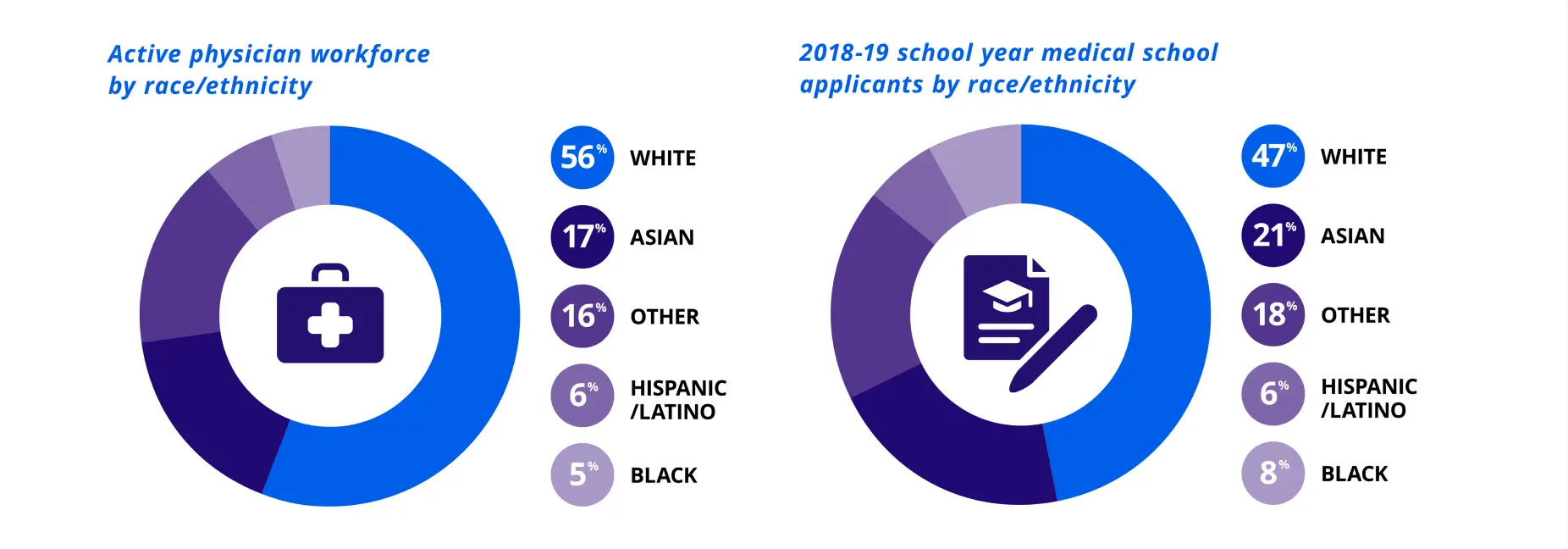
Success Story
September 2, 2022
Not finding what you’re looking for?

Helping underrepresented
minorities matriculate to medical
school can lead to better health
care for underserved populations.
The physician workforce has an urgent diversity problem. Today, 56% of all U.S. doctors are white, 17% are Asian, 6% are Hispanic/Latino, and 5% are Black. By contrast, according to U.S. Census data, 18.5% of the general population identify as Hispanic and 14.5% identify as Black.
The need for racial diversity in general is obvious. But that need becomes critical as the demand for doctors outpaces supply. The nation will be short 124,000 doctors by 2034, according to a study by the American Association of Medical Colleges.

A racially diverse physician workforce requires racially diverse medical schools. Yet, the diversity problem begins even before medical school. During the 2018-19 school year, medical school applicants were 47% white, 21% Asian, 6% Hispanic/Latino, and 8% are Black.
The challenge: Underrepresented minority (URM) students often face a complex mix of financial needs, gaps in preparedness and mindset, and social and family issues that can often prevent them from matriculating to medical school. However, university pipeline programs can play a critical role, giving URM students the support they need to matriculate to medical school.
Consider the University of Oklahoma College of Medicine’s OU MED REV UP!, a pipeline program that aims to aid underrepresented minority students from universities across the state via an innovative three-part approach. During the six-month program, participants receive, at no charge:
An MCAT preparation course by Kaplan
Mentoring from a current Medical OU student
Workshops on non-academic skills needed for the success on the MCAT and in Medical school
The program also helps the university fulfill a state requirement that 75% of each class is made up of Oklahoma residents. “Research shows that doctors who come from underrepresented communities go back to practice in those communities,” says Dr. Natasha Mickel, director of multicultural engagement in OU Med’s Office of Diversity, Inclusion & Community Engagement. “One way to increase the number of minority doctors going back to their communities is to help more underrepresented students get into medical school.”
OU MED REV UP! launched in January 2021 and completed its second year in May 2022.
2021 students
2022* students
* In 2022, smaller number of enrollments due to funding changes at the institution.
2021
2022
Program length
Cost to students
Funding
Grants from the U.S. Health Resources & Services Administration combined with institutional funding.
Key program components
MCAT preparation course by Kaplan
Mentoring from an OU medical student
Nonacademic and soft skills workshops
Eligibility
Among other requirements, students must be:
Enrolled at a qualified higher education institution
At least one of the following
From a disadvantaged background
First-generation college student
Participants by race
Asian | 12 | |
Black | 42 | 8 |
Hispanic | 32 | 10 |
Native American | 17 | 3 |
Other** | 45 | 4 |
Two or more races | 7 | |
White | 10 |
** In 2021, the “other” category included students who may have identified as Asian, white, two or more races, or other ethnicities.
OU MED REV UP! provides participants Kaplan-led
online test prep for the MCAT, a challenging
standardized test that’s weighted heavily in the medical
school admission process.
Pipeline programs don’t tend to place much emphasis
on the MCAT, touching on it lightly or simply giving
students test prep books. This omission leaves students
underprepared for one of the biggest hurdles to
medical school admission.
URM students are often underprepared for the MCAT
for other reasons, including the following:
The cost of test prep programs is often out of reach.
Students often don’t realize that preparing for the MCAT can require several hours of daily study for at least a year.
The test is written in a format many students have never encountered.
Kaplan provides students with a structured learning program, helping them make the best use of their time while gaining familiarity with the test format and requirements. Practice exams help prepare students for the rigors of a 7.5-hour exam.
I was having a lot of difficulty studying for the MCAT and was worried I was not going to be able to reach the scores I needed to be a competitive applicant. The Kaplan course and the community that was created with the other program members provided a great support system.
-Dyani Josephine Hope Shores, OU MED REV UP! program participant
Current OU medical students serve as mentors throughout OU MED REV UP!, providing a critical support system for participants who are often the first in their families to attend college.
The volunteer mentors are prepared for the common issues that may hold URM students back, including guilt, impostor syndrome and a lack of family support or role models. “Mentors allow them to learn from people who are where they want to be,” says Mickel.
As a first-generation student and the first in my family to pursue the medical field, I felt at a disadvantage compared to many of my peers who had a guiding hand on their journey to medical school. The OU MED REV UP! program has given me so many resources that I never would have known about and has let me open up doors to the future.
-Mackenzie Martin, OU MED REV UP! program participant
The third pillar of the OU MED REV UP! program provides students with the nonacademic skills they need for success. During workshops led by OU doctors and current medical students, participants discuss “soft skills” such as leadership, conflict resolution, organization and interviewing.
Participants also learn about financial aid, application tips and how to craft their individual journeys into personal essays for their medical school applications.
[This program] made me more resilient and increased my confidence. I loved having medical student mentors and monthly meetings.
-Zsofia Balla Monjezi, OU MED REV UP! program participant
Data from the first year of the program showed an immediate effect on participants’ MCAT scores and admissions outcomes:
raised their practice MCAT scores while in the program
of those who took the MCAT both before and after the program reported an increased score
felt prepared to take the MCAT after completing OU MED REV UP!
applied to medical school
Accepted of the 50% of those students who have so far received a response (versus national average of 41%)
waitlisted
Saramarie Azzun began her sophomore undergrad year intent on studying for the MCAT. The problem: She had no idea where to begin. No one in her family had pursued medicine and she couldn’t afford test prep. “I had the notion that I was going to figure it out later and continued to complete my first semester of sophomore year, feeling alone in the process,” says Azzun.
Then she learned about OU MED REV UP! “The program exposed me to a portion of the medical school admissions process that is often inequitable for underrepresented students like myself,” says Azzun. “I was able to begin my MCAT studies with no financial burden, which still seems unimaginable to me.”
She also connected with other pre-med students and turned to her OU MED REV UP! mentor for guidance.
A year after participating
in the program, Azzun is
applying to medical school
with confidence. “From the
financial aid workshops to
seminars about impostor
syndrome, I know now that
I’m not pursuing medical
school alone but with the
support of people in the
program,” she says.
Following on the success of the first two years of OU MED REV UP!, the university plans to expand partnerships with institutions across Oklahoma to attract more students who are a good fit for the program.
For universities that want to launch their own medical school pipeline programs, Mickel shares this advice:
Look at national statistics and see if they apply to your institution. What’s happening nationally may not apply to you.
Review your admissions data for the previous three years. Do you see the diversity and statistics that you want to see? Are there patterns between those who apply and fail and those who matriculate into medical school?
Conduct focus groups with URM students who matriculated to medical school and those who did not. What were their biggest struggles? What resources were most helpful, and what resources do they wish they had?
If your findings reveal common roadblocks, find an innovative solution to pitch to stakeholders.
Explore a partnership with another institution where you can share costs and resources.
Ultimately, any level of collaboration between institutions benefits aspiring doctors—and the future of healthcare. By creating connection and support, pipeline programs reveal to students that while their challenges are unique, they aren’t alone, and what might feel impossible is actually quite achievable.
When Oklahoma University
School of Medicine decided
to create a pipeline program
for underrepresented
minority (URM) students
who are interested in
medical school, administrators
knew they needed a
partner to handle the test
preparation component of
the program. Kaplan’s history,
as well as its current
capabilities, made the
company an ideal partner,
according to Dr. Natasha
Mickel, director of multicultural
engagement in OU
Med’s Office of Diversity,
Inclusion & Community
Engagement.
Stanley H. Kaplan founded the nation’s first test prep company in 1938. Kaplan, who was rejected from medical school during a time of ethnic quotas, believed students should have access to higher education based on merit, rather than privilege. He dedicated his career to helping students excel in the exams that would help unlock entry into higher education.
Kaplan’s origin story provides additional inspiration for URM students who face many hurdles on their path to medical school, says Mickel. She hopes its legacy will give students motivation to persevere despite the challenges.
↓ Download the article here (PDF)


“Diversity in Medicine: Facts and Figures 2019,” Figure 18. Percentage of all active physicians by race/ethnicity, 2018, Association of American Medical Colleges.
“AAMC Report Reinforces Mounting Physician Shortage,” Association of American Medical Colleges.
“Diversity in Medicine: Facts and Figures 2019,” Figure 2. Percentage of applicants to U.S. medical schools by race/ethnicity (alone), academic year 2018-2019, Association of American Medical Colleges.